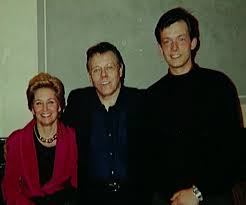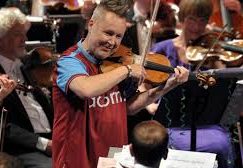Mariss Jansons told me: Conduct opera before you head an orchestra
mainAndris Nelsons has been talking in Vienna about his much-missed mentor:
‘I learned the trumpet, played in the opera orchestra in Riga, later conducted the odd performance. Mariss encouraged me to focus only on conducting. I learned so much from him. When I was faced with the choice of becoming chief conductor of the Riga Opera or Symphony Orchestra, he advised me to take up the opera first, later a symphony orchestra, because the other way rarely works.’
Mariss himself was never music director of an opera house and conducted opera very sparingly throughout his life.
He is so sorely missed.

Irina and Mariss Jansons with their protégé





It’s a symbol ( intended or not) that Andris will be at noon, tommorrow in Vienna with us, in this place Mariss liked so much. I saw Mariss 4 weeks before he died for a memorable concert with Rudy Buchbinder. I will never forget him.
That’s the way it used to be – pay your dues in the opera house. If you can be a success there, you can do anything. So many of the greats learned their profession in the pit. Maybe that’s why we have this dearth of great conducting talent nowadays.
I think it’s due to politics and management manipulations. Plenty of conductors still work in opera, but James Conlon, for one, was blocked from having a major symphonic career.
Absolutely. Very few conductors, particularly young ones, really know their craft. The business and image side, of course, and the engagement with the audiences. The technique, the art of accompaniment (incl. at the piano with singers), the aesthetic and historical knowledge not so much. Usually those who go through the central European system of Korrepetitor–> Kapellmeister–> GMD in opera houses are less likely to be charlatans with batons.
True. But that is the long way, it takes too long to really learn and nowadays being 30 is already too old for a career. The world is demanding from conductors youthness, charisma, and if possible good looks. Skill, knowledge, experience… that is not so important anymore! It is normal that in this world conductors do not even consider the long road of an opera house and take instead a shortcut.
Never understood the fuss about AN.
As a subscriber to the CBSO seasons throughout his tenure I can entirely understand the fuss. Quite outstanding especially in Romantic music including glorious Opera in Concert performances of Wagner, Strauss and Puccini but also Haydn and modern music. His Philharmonia/Bruckner performances were highlights of RFH seasons as well.
Jansons suffered his first, nearly fatal, heart attack in 1996 while conducting an opera. Perhaps he was smart to emphasize orchestral. . . .
I imagine that is because opera is more demanding, and in ways that are different, whereas symphonic conducting would not necessarily prepare you for opera, so it is better to learn opera while younger. I doubt that it makes you a better conductor, per se, it’s just more practical, and perhaps easier to get experience in opera.
It is a great deal more demanding and requires weeks of preparation before the premiere compared to days for a symphony concert programme. It also requires the ability to work alongside and co-operate with a wide variety of other artists – directors, designers, choral directors, cast principals, technical directors and their staff, and more – and the ability to mould and control that much larger team than just the orchestra. There are also so many more things that could go wrong during an opera performance that requires a special discipline.
I once attended a performance of Simon Boccanegra by Abbado and his La Scala forces in the Bunka Kaikan in Tokyo. Seated high up in the auditorium, I noted that at one point half the orchestra lights went out. Abbado urged his players to continue with whatever light from the stage illuminated their parts (not much). It was only about 15 seconds but it could have ruined any performance.
… and yet he is an embarrassing bad conductor who gets good results because he works with good orchestras that save the performance. If you don’t believe me just watch his Saint-Saens concerto performance at the Concertgebouw.
Totally disagree. I witnessed his time with the CBSO and they were glorious years which brought me and many others a great deal of pleasure.
There is something about him that inspires musicians. So they say in many orchestras he conducted. He might not be a great technician with the stick. He might not be very refined in caring about the finer details of a score. But there is something the better orchestras like. Those orchestras who do not need the technical details of conducting. That’s obviously a talent, like it or not.
That was what Karajan told Jansons an did himself in Ulm, Aachen and Berlin.
That’s true. It is in the book/interview “conversations with Karajan” by R. Osborne.
As the great Carlos used to say, conducting an opera is just a lot more difficult!